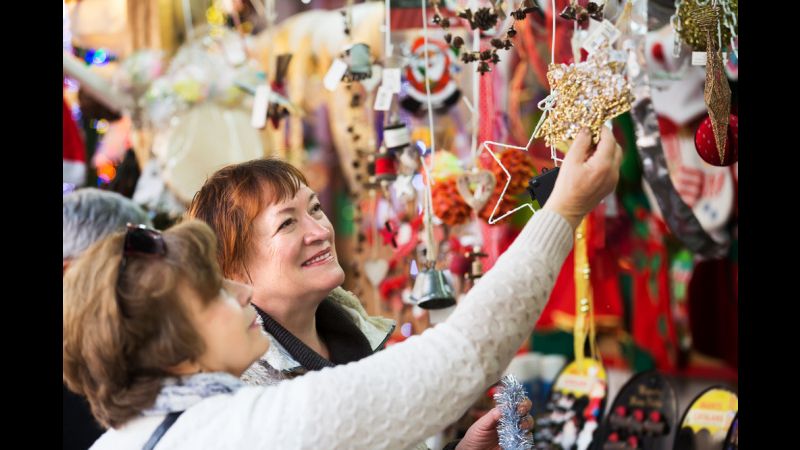Once Thanksgiving Day is over, finding that perfect gift for everyone on your list often becomes the central focus. And with all the hustle and bustle of the holiday season, this time of year holds many safety concerns for elderly shoppers. Between the threat of online holiday scams and con artists looking for unsuspecting victims, it’s essential that you know how to protect yourself with these holiday shopping safety tips.
Be Wary of Holiday Scams
Although financial scams are common year-round, the holiday season brings about an increase in the number of scams circulating online. Since elderly shoppers are specifically targeted by scammers, remain on the lookout for the most common holiday scams while you are surfing the web:
1. Delivery Notification Emails
The most common scam for elderly shoppers is an email that either confirms a product order, that you didn’t make, or notifies you that FedEx, UPS, DHL or the U.S. Postal Service has a package for you. The email also contains a link to view more details of your delivery, but clicking the link will download malware onto your computer.
Even though fake delivery notification emails look realistic, there are ways to know if it is a scam. For instance, these emails will not include any specific details, like your name, address and tracking number. They also typically come from free email services like Google or Yahoo, so be sure to pay attention to the sender address. Should you receive an email like this, simply delete it, or mark it as spam to ensure that you will not receive it again. To track any of your legitimate online purchases, you can go directly to the website you ordered from.
2. “Free” Giveaways
Another one of the most common holiday scams involves advertisements for free gifts, prizes and merchandise. Although tempting, clicking on these links will install malware on your computer. Many will also try to gain access to your personal information. A popular example of this is an advertisement offering a free vacation, when in reality, it’s just a way to trick you into providing your credit card information and joining an expensive vacation club.
Whenever you see an advertisement for a free giveaway or vacation, remember this rule of thumb: if the offer seems too good to be true, then it is most likely a scam.
3. Charity Cons
Since many view the holidays as a time of giving, scammers use this to their advantage and prey on those who are trying to do good. Common charity cons claim to support veterans, firefighters, police or victims of natural disasters, but the scammers pocket the donated money for themselves.
Although fake charities often appear this time of year, it is still possible for you to give to the less fortunate. Simply research each charity first using Charity Navigator or Give.org to make sure you’re donating to a legitimate organization.
Should you encounter any of these holiday scams, report it to your local law enforcement office and STOPFRAUD.ORG.
Staying Safe While Shopping
In addition to avoiding holiday scams, you also need to put your safety first while shopping in the stores. Not only do crowded stores encourage pickpockets, but they also increase the risk of elderly shoppers experiencing a fall or another accident. Follow these holiday shopping safety tips to ensure your safety while you’re out shopping for those end-of-year sales:
1. Take your time.
Right before the holidays, we hear endless commercials urging us to get to the stores before the deals are all gone. But don't let these advertisements rush you. Give yourself plenty of time to get all of your holiday shopping done -- the deals aren't going anywhere.
If you're easily overwhelmed by crowds, avoid shopping on weekends when the stores and malls are the busiest. Visit stores on a weekday during the late morning or early afternoon when they will be less crowded.
2. Stay alert.
Especially if you're in the middle of a crowded store, pickpockets and purse-snatchers will use this opportunity to their advantage. Always keep your wallets, purses and purchases in eyesight, and if you notice anything suspicious, tell a store security guard or clerk immediately. Parking your car in a well-lit and populated area will deter criminals outside of the store as well.
3. Use the buddy system.
Shopping with a friend is another great way to deter pickpockets. There's strength in numbers, and a pickpocket is much less likely to target you if you’re shopping with someone.
The buddy system is also a great way to prevent in-store accidents. Most accidents occur when elderly shoppers overburden themselves with too many shopping bags, but having someone beside you will allow you to carry only what you can handle. Plus, shopping with a friend is a great way to socialize and enjoy the holiday season with others.
4. Have access to help, anywhere you go.
Even if you’re shopping with a friend, accidents can still happen. That’s why it’s essential to ensure your safety with a Mobile Guardian medical alert device. Whether you experience an accident in a store, parking lot or even in your own home, you can rest assured that our 24/7 monitoring center will send help to your location.
By keeping all of these holiday shopping safety tips in mind, you can enjoy the confidence knowing that you’ll stay safe while finding the perfect gift for all of your loved ones.


